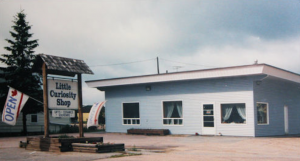 In mid 1972, a group of interested and concerned individuals began taking steps towards creating some type of service for people with developmental disabilities who resided in Almaguin Highlands. With assistance from O.A.M.R. and the Ministry of Community and Social Services, the group became incorporated on May 9, 1973, as the Almaguin Highlands Association for the Mentally Retarded. A small workshop with four people was set up in mid 1973 and operated as a work activity program with a number of volunteers and excellent support from surrounding communities.
In mid 1972, a group of interested and concerned individuals began taking steps towards creating some type of service for people with developmental disabilities who resided in Almaguin Highlands. With assistance from O.A.M.R. and the Ministry of Community and Social Services, the group became incorporated on May 9, 1973, as the Almaguin Highlands Association for the Mentally Retarded. A small workshop with four people was set up in mid 1973 and operated as a work activity program with a number of volunteers and excellent support from surrounding communities.
Growth was imminent and in 1975, the Association moved to a large two-storey building in Sundridge. At the new location, the main program thrust was the production of ceramics, which was a proven and marketable activity in other sheltered workshops. Besides ceramics, other program components were furniture refinishing, arts and crafts, and recreation.
During our years of service, the Association has taken part in numerous fundraising activities. Money has been used to send children to camp, for nursery school fees and to help in other areas of need. We have also been involved in many local trade shows and community activities.
In October of 1982, the Association hired a Family Support Worker, in response to a needs identification showing a number of children and their families who required assistance.
With a shift away from institutionalization, more people with developmental disabilities were in need of community residential supports. In February 1988 Almaguin Highlands A.M.R. expanded into Residential Services by developing its first group home, which was located in Powassan. The home supports a non-institutional lifestyle, working towards integrating people who reside there into a less structured environment whenever possible.
In 1989, the Association applied for and was granted a name change. We became known as Almaguin Highlands Community Living, in keeping with similar name changes by sister agencies province-wide.
The Life Enrichment Program staff support people with contracts, some of which have involved piecework, lawn maintenance, catering and custodial duties.
In 1993 a Supported Independent Living Program (S.I.L.) was initiated in Powassan. People living independently received staff support on an ‘as-needed’ basis. The program grew as the need increased, and our S.I.L. program now provides many people with in-home support, based on their particular needs.
In February of 1999, a second group home (Glendale) was established in the Powassan area. Twenty-four hour support is provided in that home for four people.In January 2000, the residential program expanded to include accommodations in Sundridge. Starting with one resident, the Albert St. home now houses three people in a 24-hour care setting.
In recent years, a need was identified for intermittent relief for parents/caregivers. A respite program was developed which provides either in-home or out-of-home respite care for both adults and children who request and qualify for this service. Care providers are either parent-chosen or agency-recruited.
The Transitions Program was developed in 2004; it focuses on the special needs of people between the ages of 18 – 23. People are educated as to what choices are available to them after high school, be it higher education, employment or independent living.
A Family Home Program for children was added to our services in 2006. This allows children to live in an alternate, home-like environment in the community, when living with their natural family is not an option, or when a prolonged period of respite is requested by the family.
Over the years, many changes have transpired. Services are developed as needs arise and/or change. An ‘Essential Lifestyle Plan’ is developed with each person we support. The individual, their family, friends and significant others are integral to this planning. We are very pleased to be able to offer such a wide variety of services to the people we serve and their families.

